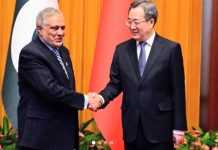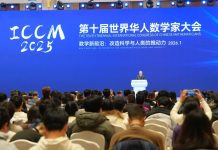BEIJING: “China’s higher education has made great progress in recent years and the overall development momentum is very strong. Cooperation between China and Pakistan in higher education has been deepening, and the cooperation in technology transfer and transformation of technological achievements in universities needs to be strengthened for a closer shared future,” highlighted Prof. Dr. Iqrar Ahmad Khan, Vice Chancellor of University of Agriculture, Faisalabad (UAF).
Lauding China’s higher education system, Dr. Iqrar said that China’s commitment to education has been evident through its continuous investment in R&D, infrastructure and faculty development. “China’s HR and infrastructure falls in the highest category globally. The best part now is its global outreach and diversity and its linkages with industry for problem solving and commercialization of knowledge which is worth learning.”
At the World University Presidents Forum themed “an era of transformation and the mission of universities” hosted by Chinese Association of Higher Education, Peking University and Tsinghua University in Beijing last week, Prof. Dr. Iqrar Ahmad Khan noted that with 65 selected heads of universities sharing their views and 500 participants from 36 countries and regions, this was a unique opportunity to understand the current higher education landscape across the globe and emerging future.
On the occasion, Ding Zhongli, vice chairman of the Standing Committee of the National People’s Congress, stressed China’s willingness to exchange and share development experiences with universities around the world and contribute to the building of a community with a shared future for mankind.
With a focus on innovation, quality and internationalization, China has been making significant strides in higher education development, attracting students and scholars from around the world. Prof Dr Iqrar said that the number of Pakistani students studying in China stood at 26,000 with over 1,000 postdocs and visiting scientists.
Pak-China higher education collaboration has brought mutual benefits in terms of bilateral relations, economic opportunities, knowledge exchange, human resouce development, and education system improvement. By attracting Pakistani students in China, China can boost its soft power and influence in Pakistan. These students can act as cultural ambassadors, promoting language, culture and values of both countries, noted Prof Iqrar. He added that “although there are contineous senior level Chinese experts and language teachers visiting Pakistan, the number of Chinese students studying in Pakistan is relatively small. Efforts are being made to increase the presence of Chinese students in Pakistani universities.”
Under China-Pakistan Economic Corridor (CPEC), a flagship project of China’s Belt and Road Initiative (BRI), educational cooperation has emerged as a key area. –Agencies






